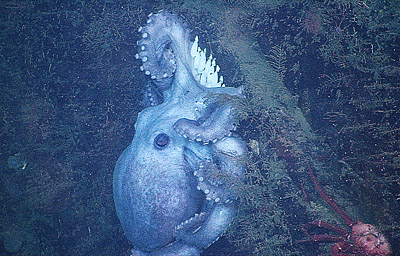
How Long Do You Think She Broods Her Eggs? Mother of The Year: Octopus Mom
In fact, the title “mother of the many years ” may be more suitable. For it was seen that a female octopus of the Graneledone boreopacifica species brooded her eggs for over four and a half years, without leaving its spot and possibly without eating.
In a recent article published in the open access journal Public Library of Science (PLOS ONE) , marine biologists from the Monterey Bay Aquıarium Research Institute report how, while working at a depth of 1400 meters in May, 1907, they had discovered a female octopus nesting vertically with her eggs on a ledge of rock. She was not there at a previous dive in April. At 18 subsequent dives over the next four and a half years, they observed that the same octopus which they identified from her scars did not leave her perch, not showing any attempt to hunt, and even leaving alone such prized food as crabs and shrimp unless they posed a threat to the eggs.
As the years passed, researchers observed tiny octopuses gradually developn in the translucent eggs while the mother shriveled, her skin becoming loose and pale. Researchers last saw the octopus in September, 2011. At their next dive the perch was empty but for 160 shredded remains of eggs.
Because the teardrop shaped octopus eggs the size of small olives require lots of oxygen, the mother has to continuously stir the water over the eggs to ensure the steady circulation of water. The eggs also have to be protected from silt and sand.
Normally, most cephalopods like octopuses and squids die in about two years after their eggs hatch and a new generation takes to the ocean.
Octopuses of the Graneledone boreopacifica species, on the other hand, have a lifespan more than twice as much. Researchers explain this with the slow development of the baby octopuses within the eggs in the chilly depths of the ocean bed. The water temperature at the perch of the record-setting mom was measured at 3⁰C.
Marine biologists see the extended brooding periods of G. boreopacifica as an evolutionary tradeoff: The lengthy egg care fatally weakens the mother. But the lengthy brooding ensures that G. boreopacifica babies are fully developed in the eggs, and on emerging they can cope with the harsh environment of the ocean bed and hunt for themselves.
REFERENCES
- 1. “Deep-sea octopus broods eggs for over 4 years -- longer than any known animal”, Monterey Bay, Aquarium Research Institute, 30 July 2014
